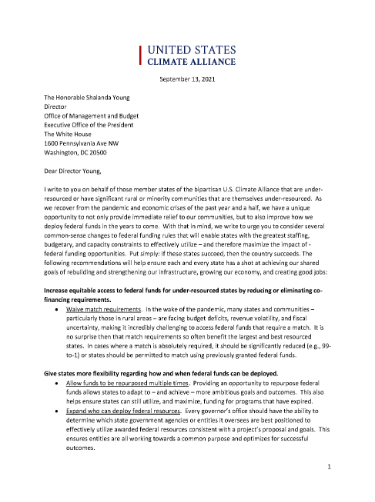Home / U.S. Climate Alliance Calls on OMB and Congress to Reform Federal Funding Rules

Tags
- Letter
U.S. Climate Alliance Calls on OMB and Congress to Reform Federal Funding Rules
September 13, 2021
As we recover from the pandemic and economic crises of the past year and a half, we have a unique opportunity to not only provide immediate relief to our communities, but to also improve how we deploy federal funds in the years to come. With that in mind, we write to urge you to consider several common-sense changes to federal funding rules that will enable states with the greatest staffing, budgetary, and capacity constraints to effectively utilize — and therefore maximize the impact of — federal funding opportunities.
Put simply: If these states succeed, then the country succeeds.
About the Alliance
Launched in 2017 by the governors of Washington, New York, and California to help fill the void left by the U.S. federal government’s withdrawal from the Paris Agreement, the Alliance has grown to include 24 governors from across the U.S. representing approximately 60 percent of the U.S. economy and 55 percent of the U.S. population. Governors in the Alliance have pledged to collectively reduce net greenhouse gas emissions by at least 26-28 percent by 2025, 50-52 percent by 2030, and 61-66 percent by 2035, all below 2005 levels, and collectively achieve overall net-zero greenhouse gas emissions as soon as practicable, and no later than 2050.
The Alliance’s states and territories continue to advance innovative and impactful climate solutions to grow the economy, create jobs, and protect public health, and have a long record of action and results. In fact, the latest data shows that as of 2023, the Alliance has reduced its collective net greenhouse gas emissions by 24 percent below 2005 levels, while increasing collective GDP by 34 percent, and is on track to meet its near-term climate goal of reducing collective greenhouse gas emissions 26 percent below 2005 levels by 2025.
###